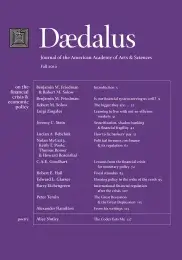Is our financial system serving us well?
In 1772, at the height of Scotland’s worst banking crisis in two generations, David Hume wrote to his close friend Adam Smith. After recounting the bank closures, industrial bankruptcies, spreading unemployment, and even growing “Suspicion” of the soundness of the Bank of England, Hume asked Smith, “Do these Events any-wise affect your Theory?”
They certainly did. Smith’s analysis of the role of banking in The Wealth of Nations, published just four years later, clearly reflected the lessons he took away from the 1772 crisis. In contrast to the doctrinaire antiregulatory ideology with which he is usually associated by today’s economists, Smith favored such measures as usury laws–specifically, no lending at interest rates above 5 percent –and restrictions on the obligations that banks could issue.1
Large-scale and unusual events, especially when they bring unwanted consequences, provide an opportunity to ask basic questions. Even if no one is at fault for causing an event (an earthquake, for example), it is only natural to ask what might be done differently to mitigate the consequences should a similar catastrophe recur. When disaster is the result of human action, the question at issue is not merely about containment; it is also a question of prevention. It is no surprise, therefore, that the recent financial crisis has prompted a flood of proposals to reform the regulation of financial markets and financial institutions in the United States and elsewhere. The Dodd-Frank Wall Street Reform and Consumer Protection Act, which Congress passed in July, made some of them into U.S. law.
What is missing from this conversation, however, is any significant probing of the more fundamental aspects of how well our financial system is serving us, and at what cost. To date, the discussion has focused on the specific symptoms of this particular episode of financial malfunction: the losses incurred by investors, the need for taxpayer-financed bailouts, the disruptions triggered by Lehman Brothers’ failure, and the like. Most people are aware, too, that the associated loss of jobs, incomes, and profits was a result of what went wrong in the financial sphere. But no one seems to be relating these costly manifestations to the role that financial markets should play in our economy in the first place or asking how well the markets are performing that role.
The crucial function of the financial markets in an economy like that of the United States is to allocate scarce investment resources. Typically, about one-fifth of what the U.S. economy produces (in recent years the fraction has been somewhat smaller) is devoted to investment of all kinds: factories and machinery that allow our firms to produce physical goods, office buildings and computers to house and equip a vast service sector, homes for a population of more than three hundred million, and inventories on the shelves of supermarkets and clothing stores. No one simply decrees that one-fifth of our nation’s total output is the ideal share to invest for all these purposes. That outcome is the result of countless decisions made every day by individual businesses and homeowners as they interact with the banks, insurance companies, stock buyers, mortgage lenders, and other providers of the funds they need to carry out their desired investment programs. Similarly, no central agency dictates that such-and-such a percentage of the overall investment should go into the computer industry, some percentage into opening new restaurants, and another percentage into putting up new apartment buildings. That allocation is also the result of countless individual-level market interactions.
. . .
